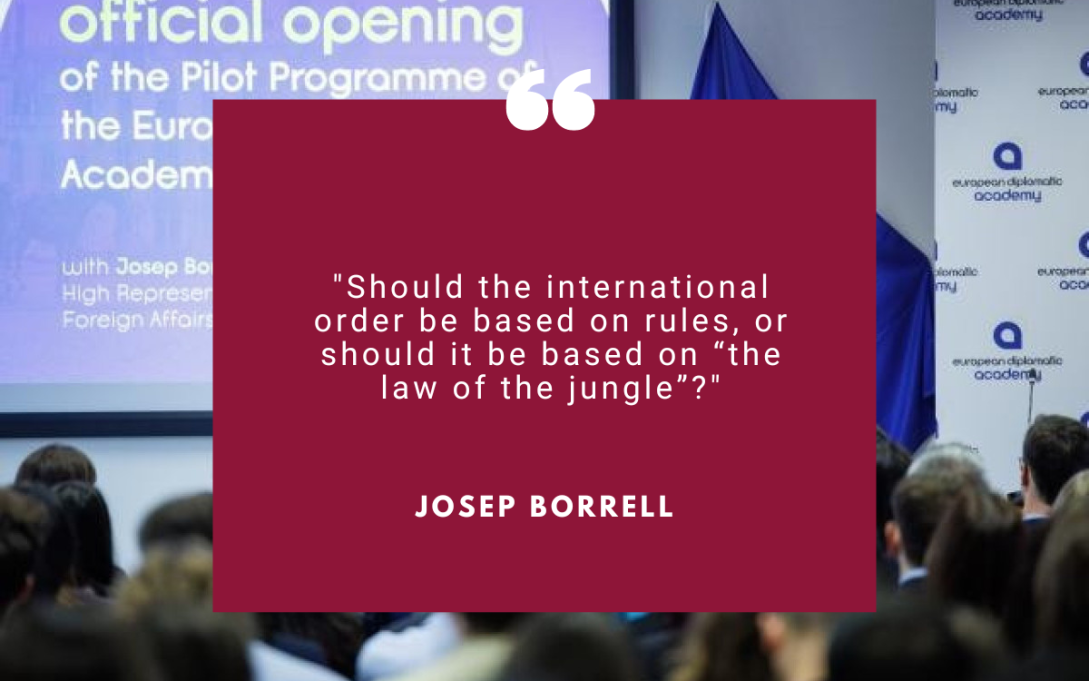On metaphors and geo-politics

The metaphor of “the garden” and “the jungle” is not my invention. Some truly dislike it because, among others, it has been used by US neo-conservatives, but I am far from this school of political thought. In fact, the concept has been present in academic and political debates for decades, because it refers to a simple question that we face every day: should the international order be based on principles accepted by all, regardless of the strength of its actors, or should it be based on the will of the strongest, which is commonly called “the law of the jungle”?
Regrettably, the world in which we live today looks more and more like a “jungle” and less and less like a “garden”, because in many parts of the world, the law of the strongest is eroding agreed international norms.
This trend is worrying for everyone, including for Europeans given where we came from historically. From the start, the European integration project came from a rejection of power politics. We succeeded by supplanting power calculations with legal procedures. That is why I spoke about the “European garden”: our record, thanks to our Union, of cementing peace and cooperation among previously warring parties, with a shared commitment to uphold rules and laws.
But now war is back in Europe and around the globe we see a transformation of geopolitics. We face a world of power politics with the weaponisation of interdependence and more examples of countries using force, intimidation and blackmail to get their way. The growth of this lawless world and disorder is what I meant when talking about the "jungle". My reference to “jungle” has no racist, cultural or geographical connotation. Indeed and unfortunately, the “jungle” is everywhere, including today in Ukraine. We must take this trend seriously and that was my message to the students. Certainly, we should not retreat behind the false security of walls and isolationism.
Some have misinterpreted the metaphor as “colonial Euro-centrism”. I am sorry if some have felt offended. I believe and have said, for instance to the EU Ambassadors last week, that we are often too Euro-centric and need to be humble and get to know better the rest of the world including the Global South. I have always spoken out against a “Fortress Europe” approach and been strongly engaged in advancing relations with other parts of the world.
I also have enough experience to know that neither Europe nor “the West” is perfect and that some countries of “the West” have at times violated international legality.
Still, today the principal issue before us Europeans is Russia’s aggression against Ukrainian sovereignty and international law. It is positive that the overwhelming majority in the UN General Assembly so clearly condemned Russia’s actions last week. This shows there are many around the world who want a rules-based system, not one governed by a “might makes right” attitude. It follows that “gardeners”, those who want to build a peaceful and lawful order, everywhere should unite and work together to beat back “the jungle”.
All my life I have been totally opposed to any form of contempt, or racism towards anyone. In my current position, I have tried to tell Europeans, the students in Bruges and EU ambassadors, not to barricade ourselves in our world of relative comfort, trying to protect it by building walls, but to engage more with the rest of the world, with an open spirit, looking at it the way it is and not according to our Euro-centric view.
MORE FROM THE BLOG

“A Window on the World” – by HR/VP Josep Borrell
Blog by Josep Borrell on his activities and European foreign policy. You can also find here interviews, op-eds, selected speeches and videos.
